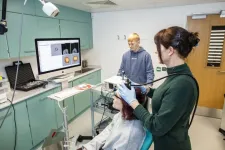(Press-News.org) The Lancet: Health threats of climate change reach record-breaking levels, as experts call for trillions of dollars spent on fossil fuels to be redirected towards protecting people’s health, lives and livelihoods
New global findings in the 8th annual indicator report of the Lancet Countdown on Health and Climate Change reveal that people in every country face record-breaking threats to health and survival from the rapidly changing climate, with 10 of 15 indicators tracking health threats reaching concerning new records.
In 2023, people were exposed to, on average, an unprecedented 50 more days of health-threatening temperatures than expected without climate change. Extreme drought affected 48% of the global land area - the second-highest level recorded – and the higher frequency of heatwaves and droughts was associated with 151 million more people experiencing moderate or severe food insecurity than annually between 1981 and 2010.
Authors call out governments and companies who continue “fuelling the fire” with persistent investment in fossil fuels, all-time high energy-related greenhouse gas emissions, and years of delays in adaptation that are narrowing the survival chances of people across the globe.
Report underscores that the financial resources to deliver net zero emissions and secure a healthy future are available. Yet governments and companies are spending trillions of dollars on fossil fuel subsidies and investments that are making climate change worse—money that could be redirected towards clean renewable energy and activities that benefit people’s health, livelihoods and wellbeing.
Authors argue that the findings must force a global health-centred transformation of financial systems – shifting resources from the fossil fuel-based economy towards a zero-emissions future – that will deliver rapid health and economic benefits through improved energy access and security, cleaner air and water, healthier diets and lifestyles, and more sustainable job opportunities.
As multiple health threats from climate change break dangerous new records, the 2024 Report of The Lancet Countdown on Health and Climate Change calls for the trillions of dollars spent funding fossil fuels to be redirected and used to drive a rapid and fair transition to a net zero greenhouse gas (GHG) economy, instead of harming the health of billions of people across the world.
“This year’s stocktake of the imminent health threats of climate inaction reveals the most concerning findings yet in our eight years of monitoring,” warned Dr Marina Romanello, Executive Director of the Lancet Countdown at University College London. “Once again, last year broke climate change records—with extreme heat waves, deadly weather events, and devastating wildfires affecting people around the world. No individual or economy on the planet is immune from the health threats of climate change. The relentless expansion of fossil fuels and record-breaking greenhouse gas emissions compounds these dangerous health impacts, and is threatening to reverse the limited progress made so far, and put a healthy future further out of reach.”
She added: “Despite this threat, we see financial resources continue to be invested in the very things that undermine our health. Repurposing the trillions of dollars being invested in, or subsidising, the fossil fuel industry every year would provide the opportunity to deliver a fair, equitable transition to clean energy and energy efficiency, and a healthier future, ultimately benefiting the global economy.”
The 8th Lancet Countdown annual indicator report, funded by Wellcome and developed in close collaboration with the World Health Organization, represents the work of 122 leading experts from 57 academic institutions and UN agencies globally, including the World Health Organisation (WHO) and the World Meteorological Organisation (WMO). Published ahead of the 29th UN Conference of the Parties (COP), the report provides the most up-to-date assessment of the links between health and climate change, including new metrics which record extreme precipitation, stranded coal assets, tree cover loss, sand and dust storms, rising nighttime temperatures and sleep loss, and climate and health education and training.
Record-breaking human costs of climate change
The year 2023 was the hottest on record, with persistent droughts, deadly heat waves, and devastating forest fires, storms and floods, and disastrous impacts on the health, lives and livelihoods of people worldwide.
Heat-related deaths continue to rapidly increase, and are expected to exceed cold-related deaths in a high-warming scenario. Globally in 2023, heat-related deaths in those over age 65 increased by a record-breaking 167% above deaths in the 1990s, substantially above the 65% increase that would have been expected had temperatures not changed (i.e., accounting only for changing demographics). This compounds existing inequities, with the number of health-threatening heat days added by climate change higher in countries with a low human development index (a measure of education, income, and life expectancy).
Worldwide in 2023, people were also exposed to, on average, an all-time high of 1,512 hours of high temperatures posing at least a moderate risk of heat stress while undertaking light outdoor exercise such as walking or cycling—a 27.7% increase (328 hours) on the 1990-1999 yearly average. Increasing temperatures have also led to a record 512 billion potential hours of labour lost globally in 2023 (a 49% increase above the 1990-1999 average), with global potential income losses equivalent to US$835 billion—equivalent to a substantial proportion of GDP in low- (7.6%) and middle-income countries (4.4%).
During the last decade (2014-2023), 61% of the global land area saw an increase in extreme precipitation events compared to the 1961-1990 average, increasing the risk of flooding, infectious disease, and water contamination. In parallel, more frequent heatwaves and droughts were responsible for 151 million more people experiencing moderate to severe food insecurity in 124 countries in 2022, than annually between 1981 and 2010. As a result, the report estimates the total yearly value of economic losses (linked to physical assets rather than ill-health) resulting from extreme weather events at US$227 billion from 2019-2023, a value that exceeds the GDP of 60% of the world’s economies.
The climatic suitability for the spread of deadly mosquito-borne infectious diseases has also increased. For example, the transmission risk of dengue by Aedes albopictus mosquitoes rose by 46% and Aedes aegypti by 11% over the last decade (2014-2023) compared to 1951-1960. An all-time high of over 5 million dengue cases were reported in over 80 countries/territories in 2023 [1].
“People in all parts of the world are increasingly suffering from the financial and health effects of climate change, and disadvantaged communities in resource-limited nations are often the worst affected, yet provided with the least financial and technological protections,” said Prof. Wenjia Cai, Lancet Countdown Working Group 4 Co-Chair at Tsinghua University. “Adaptation is failing to keep pace with the rapidly growing health threats of climate change, and with limits to adaptation looming, and universal health coverage still a pipe dream for more than half the world’s population, financial support is urgently needed to strengthen health systems to better protect people.”
Governments and companies continue fuelling the fire, threatening to reverse limited progress
New and updated indicators reveal that governments and companies continue fuelling the fire with persistent investments in fossil fuels, all-time high GHG emissions, and staggering tree loss, reducing the survival chances of people all around the globe. In 2023, global energy-related carbon dioxide emissions reached an all-time high, 1.1% above 2022, and the proportion of fossil fuels in the global energy system increased for the first time in a decade during 2021, reaching 80.3% of all energy (up from 80.1% in 2020).
While climate action is limited by the lack of funding, fossil fuel investment still attracted 36.6% of global energy investment in 2023, with many governments also increasing explicit fossil fuel subsidies in response to soaring energy prices following Russia’s invasion of Ukraine. In 2022, 72 of the 86 countries (84%) analysed in the report subsidised fossil fuels for a record net total of US$1.4 trillion (taking into account the contribution of both carbon pricing and fossil fuel subsidies), dwarfing any financial commitments in support of climate action made at COP28. These subsidies exceeded 10% of national health spending in 47 of the countries, and 100% in 23 countries.
Against this concerning backdrop, the Loss and Damage Fund established at COP27 in 2022 to support countries most vulnerable to the impacts of climate change, received initial pledges totalling the much smaller sum of US$700 million, which amounted to less than 0.2% of the estimated requirement every year [2]. Similarly, the decade-long delay in delivering the comparatively modest sum of US$100 billion a year promised to support vulnerable countries cope with climate change has hampered progress and widened global inequities.
Bolstered by record profits, the world’s 114 largest oil and gas companies (covering 80% of all production projected by 2040) have increased their projected fossil fuel production levels since last year, which would lead to their GHG emissions exceeding levels compatible with 1.5°C of warming by 59% in 2030, and a staggering 189% in 2040, further reducing their compliance with the Paris Agreement. Worse still, 33 of these companies are expected to exceed their 1.5°C-compatible GHG emissions by over 300% in 2040.
Added to this, new data from this year’s report estimates that almost 182 million hectares of forest were destroyed between 2016 (when the Paris Agreement entered into force) and 2022, equivalent to 5% of the global tree cover, diminishing the world’s natural capacity to capture carbon dioxide. The greatest tree cover losses were in Russia (35.8 million hectares), the USA and Canada (almost 15 million hectares in each country). At the same time, the rise in red meat and dairy intake increased diet-related deaths by 220,000 between 2016 and 2021, and contributed to a 2.9% rise in agricultural GHG emissions.
Prof. Stella Hartinger, co-author and Lancet Countdown Latin America Director at Universidad Peruana Cayetano Heredia, said: “Oil and gas companies – supported by many governments and the global financial system - continue to reinforce the world’s addiction to fossil fuels. In a world in which survival depends on phasing out fossil fuels, these short-sighted investments set us up for financial turmoil as we pursue a liveable future. These perverse investments, coupled with the serious failure to make the necessary structural changes in the energy sector to support the net-zero transition, are jeopardising the economies on which people’s livelihoods depend, and leaving the health and survival of millions of people at risk.”
Redirecting funding to actions that benefit—rather than harm—people’s health
Despite the record-breaking health harms laid out in the report, there are some reasons for cautious optimism. Deaths from fossil fuel-derived air pollution fell almost 7% from 2.25 million in 2016 to 2.09 million in 2021, with 59% of this decline due to efforts to reduce pollution from coal burning, demonstrating the life-saving potential of coal phase-out.
At the same time, the share of electricity generated by clean modern renewables reached 10.5% in 2021, almost double that of 2016 (5.5%), while global investment in clean energy grew 10% in 2023 to US$1.9 trillion, exceeding fossil fuel investment by 73%. Meanwhile, employment in renewables reached a record-high with 13.7 million employees in 2022 (35.6% increase since 2016), reaffirming that renewable energy can support job security now and in the future.
“Progress towards an equitable and healthy future requires a global transformation of financial systems, shifting resources away from the fossil-fuel based economy towards a zero-emissions future,” said co-author Prof. Anthony Costello, Co-Chair of the Lancet Countdown. “For successful reform, people’s health must be put front and centre of climate change policy to ensure the funding mechanisms protect wellbeing, reduce health inequities and maximise health gains, especially for the countries and communities that need it most.”
The report notes that the engagement of individuals, corporations, scientists, and international organisations with climate change and health is growing, raising hopes that a healthy, prosperous future could still be within reach.
“Amidst global turmoil, the powerful and trusted leadership of the health community could hold the key to reversing these concerning trends and harnessing new opportunities to put the protection and promotion of health and survival at the centre of political agendas,” said Prof. Costello. “Nowhere will this be more important than at COP29 where the financial transition will take centre stage, offering a vital opportunity to deliver a resilient, healthier future.”
Responding to the report publication, UN Secretary-General, António Guterres (who was not involved in writing the report) said: “Record-high emissions are posing record-breaking threats to our health. We must cure the sickness of climate inaction – by slashing emissions, protecting people from climate extremes, and ending our fossil fuel addiction – to create a fairer, safer, and healthier future for all.”
NOTES TO EDITORS
[1] Dengue- Global situation (who.int)
[2] A climate loss and damage fund that works | Lowy Institute
Publishing annually in The Lancet, with strategic and financial support from Wellcome, The Lancet Countdown is hosted by University College London, and works with almost 300 leading researchers from around the world to track and understand the evolving links between climate change and people’s health.
The Lancet Countdown works with key strategic partners:
The Lancet Countdown is led by University College London’s Institute for Global Health.
The Lancet Countdown was founded by Wellcome and continues to receive core strategic and financial support.
The Lancet Countdown works in strategic partnership with WHO.
The Lancet Countdown’s global report represents the work of 122 leading experts from 57 academic institutions and UN agencies globally. A full list of authors can be found in the report. END
The Lancet: Health threats of climate change reach record-breaking levels, as experts call for trillions of dollars spent on fossil fuels to be redirected towards protecting people’s health, lives and
2024-10-30
ELSE PRESS RELEASES FROM THIS DATE:
‘Weekend warrior’ exercise pattern may equal more frequent sessions for lowering cognitive decline risk
2024-10-29
Just one or two sessions of physical activity at the weekend—a pattern of exercise dubbed ‘weekend warrior’---may be just as likely to lower the risk of cognitive decline, which can often precede dementia, as more frequent sessions, concludes research published online in the British Journal of Sports Medicine.
And it may be more convenient and achievable for busy people as well, suggest the researchers.
It’s important to identify potentially modifiable risk factors for dementia because a 5-year delay in onset might halve its prevalence, they say, adding that nearly all the evidence to date comes from studies ...
Physical activity of any intensity linked to lower risk of death after dementia diagnosis
2024-10-29
Physical activity of any intensity after a diagnosis of dementia is associated with around a 30% lower risk of death, finds research published online in the British Journal of Sports Medicine.
The findings prompt the researchers to conclude that those affected should be encouraged to keep up or start an exercise routine, especially as average life expectancy after a diagnosis of dementia may be only around 4-5 years.
Previously published research has linked physical activity with a lower risk of death in people with the disease, but these studies have focused on a single point in time. So it’s not clear if changes in the amount or intensity of physical ...
Brain changes seen in lifetime cannabis users may not be causal
2024-10-29
Lifetime cannabis use is associated with several changes in brain structure and function in later life, suggests an observational study, but these associations may not be causal, finds a genetic analysis of the same data, published in the open access journal BMJ Mental Health.
Some other unidentified factors may explain the differences found, say the researchers, who nevertheless emphasise that further research is needed to fully understand the effects of heavy use and cannabis potency on the brain.
Cannabis use has increased worldwide following its ...
For the love of suckers: Volunteers contribute to research on key freshwater fishes
2024-10-29
A new paper published today, led by Chicago’s Shedd Aquarium, reveals how volunteers across Illinois, Wisconsin and Michigan enabled researchers to gather seven years of data on the spawning migrations of suckers, an understudied yet essential group of freshwater fishes. Using observations collected by trained members of the public, the collaborative team of researchers have discovered that temperature is the primary trigger for sucker spawning migration, which can help inform conservation strategies in light of a changing climate.
“We believe that conservation of native, non-game fishes ...
Bill and Mary Anne Dingus commit $1M to fund Human Impacts on the Earth Fund at Rice
2024-10-29
Bill Dingus ’81, a Rice University alumnus, and his wife Mary Anne have pledged $1 million to support the university’s Human Impacts on the Earth Fund, dedicated to mitigating and addressing the negative environmental effects caused by human activities on the planet. Additionally, the Dingus family is matching other donors’ contributions to the fund up to $250,000.
The Dingus’ donation enables the launch of the Earth and Planetary Opportunities in Research (EXPLORE) program, a new initiative offered through the Department of Earth, Environmental and Planetary Sciences (EEPS) that allows undergraduates of any major hands-on experience in research projects ...
Most patients can continue GLP-1 anti-obesity drugs before surgery
2024-10-29
Most patients may continue to safely take glucagon-like peptide-1 (GLP-1) receptor agonists as prescribed before undergoing elective surgery and gastrointestinal endoscopies, according to new clinical guidance released today by five surgical and medical societies including the American Society for Metabolic and Bariatric Surgery (ASMBS), American Society of Anesthesiologists (ASA), American Gastroenterological Association (AGA), International Society of Perioperative Care of Patients with Obesity (ISPCOP), and Society of American Gastrointestinal and Endoscopic Surgeons (SAGES).
The guidance, published online in Surgery for Obesity and Related Diseases ...
Computational tool developed to predict immunotherapy outcomes for patients with metastatic breast cancer
2024-10-29
FOR IMMEDIATE RELEASE
Using computational tools, researchers from the Johns Hopkins Kimmel Cancer Center and the Johns Hopkins University School of Medicine have developed a method to assess which patients with metastatic triple-negative breast cancer could benefit from immunotherapy. The work by computational scientists and clinicians was published Oct. 28 in the Proceedings of the National Academy of Sciences.
Immunotherapy is used to try to boost the body’s own immune system to attack cancer cells. However, only some patients respond to treatment, explains lead study author Theinmozhi Arulraj, Ph.D., a postdoctoral fellow at Johns Hopkins: “It’s really important ...
Cerebral embolic protection by geographic region
2024-10-29
About The Study: The PROTECTED transcatheter aortic valve replacement (TAVR) trial could not show that the use of cerebral embolic protection (CEP) had a significant effect on the incidence of periprocedural stroke during TAVR. Although there was no significant interaction by geographic region, this exploratory post hoc analysis suggests a trend toward greater stroke reduction in the U.S. cohort but not in the outside the U.S. cohort. These findings are hypothesis generating, and further research is needed to determine if regional differences in patient characteristics or procedural practices ...
12 new Oriental weevil species discovered using advanced imaging tools
2024-10-29
Jake Lewis, an entomologist in the Environmental Science and Informatics Section at the Okinawa Institute of Science and Technology (OIST), is fascinated by weevils, a diverse group of beetles that includes many species with elephant trunk-like mouthparts (called a rostrum). Weevils provide various ecosystem services such as pollination and decomposition, but some species are serious pests known to decimate crop fields and timber forests.
Using x-ray microtomography, a 3D imaging technique ...
Ultrasound can be used as search and rescue tool for the brain
2024-10-29
Ultrasound, once used almost exclusively to take images of the body, is quickly developing into a targeted therapy that can have a potentially life-changing impact on our brains, according to the authors of a new article.
For decades, health professionals across the world have used ultrasound as a means of monitoring the development of unborn babies and assessing the health of patients’ internal organs.
But writing in the journal PLOS Biology, researchers from Stanford University, the University of Plymouth, and Attune Neurosciences say it has now been demonstrated to offer a non-invasive and precise way of targeting ...




